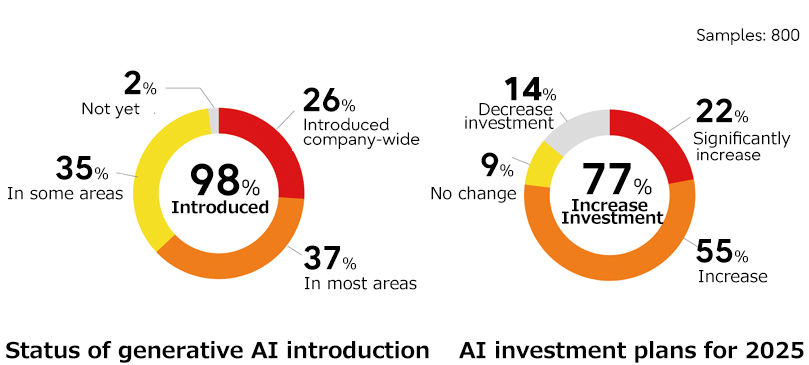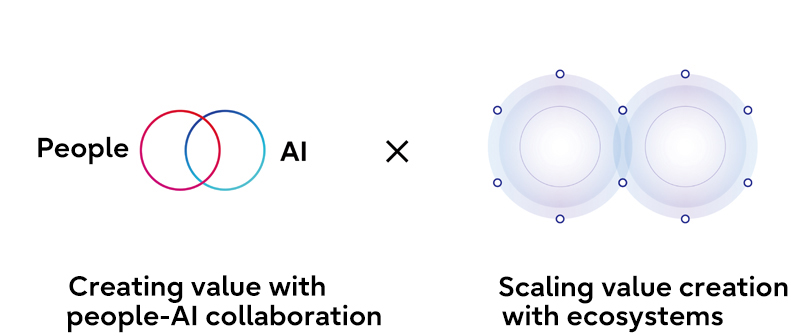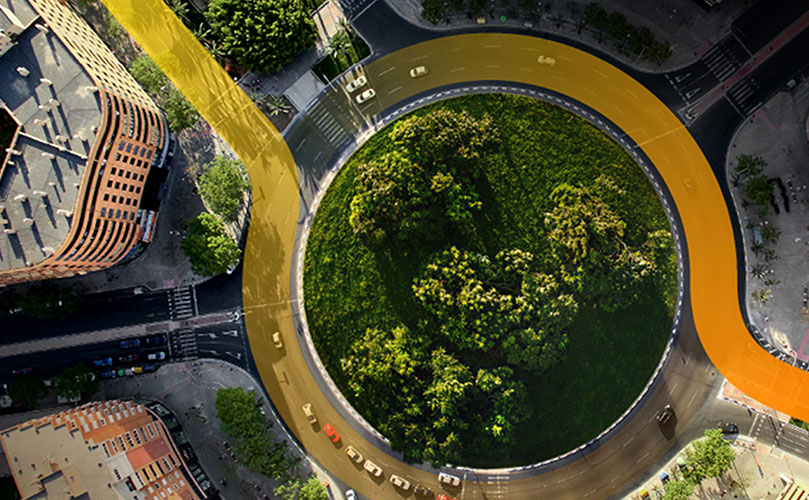Fujitsu Technology and Service Vision 2025 (Part I) People and AI: Fujitsu's vision for the future of business

Article | 2025-8-26
4 minute read
Fujitsu has recently released our new Technology and Service Vision 2025. This annual publication shares compelling stories about how evolving technologies are shaping the future of business and society.
In this article, we explore one such story: the powerful potential of artificial intelligence and human collaboration to address pressing societal issues.
The future of AI: From early adoption to strategic assessment
In February 2025, Fujitsu conducted a survey of 800 corporate executives in 15 countries to create Fujitsu Technology and Service Vision 2025 (FT&SV 2025). (*1)
In this survey, an overwhelming 98% of respondents reported that their companies have already implemented AI solutions.
Regarding future investment plans, 77% indicated they would increase their AI investments, while 14% plan to decrease them.
*1) US research firm Frost & Sullivan conducted the survey on behalf of Fujitsu.

When asked about the future of work in an AI-driven world, 79% of respondents predicted that all employees will be performing their jobs with the assistance of AI by 2030.
Furthermore, 82% of managers believe that "the use of AI is key to alleviating their labor shortages."

"The sustained interest in AI, even after initial deployments, is a significant finding," explains Hiroshi Nishikawa, Senior Director, Fujitsu Technology Marketing Strategy Division. "It suggests that organizations are seeing real value and are eager to explore further applications."
However, Nishikawa explains a nuanced perspective. "Many executives still expect AI to be a magic bullet, while others are disappointed by the lack of immediate Return on Investment."
He pointed out a significant trend: the number of respondents planning to "increase AI investment" has dropped 11 percentage points since last year (from 88% in 2024).
This shift, according to Nishikawa, indicates a more mature approach.
"We're seeing a move away from simply trialing AI, towards carefully assessing its best applications. Interest remains high, but the perception of technology is evolving."
Regenerative Ecosystems: A new approach to solving societal problems
FT&SV 2025 explores how companies and work practices will evolve as we strive toward a Net Positive society: a state where a company's positive impact outweighs its negative impact on society.
While traditional AI technologies like deep learning and generative AI continue to mature, new approaches are emerging, including "agentic AI," where AI autonomously executes actions based on collected and analyzed information.
Our technology vision for 2025 is embodied by the concept of a "Regenerative Ecosystem," representing a new value creation ecosystem designed to foster a Net Positive society.

The two circles on the left illustrate how AI expands the scope of our knowledge.
"We believe AI can significantly boost productivity by offering new insights, suggestions, and even handling certain tasks," said Nishikawa.
"The diagram on the right depicts a network of people and AI integrated across all areas of the enterprise," Nishikawa explained. "When all employees are proficient in AI, the company's capabilities are greatly amplified. AI connects these companies, facilitates data sharing, and supports the development of supply chains, ultimately forming an ecosystem that transcends traditional boundaries. The key message is that AI-mediated ecosystems can drive solutions for pressing social issues like global warming and aging societies."
Human-centric values: Guiding principles for a technological future
Since 2013, Fujitsu has articulated its future vision through the annual Fujitsu Technology and Service Vision.
Nishikawa notes that developing the 2025 vision was particularly challenging, given the rapidly shifting political and economic landscape worldwide.
He emphasizes that he wanted to provide scenarios that would share a common thread: achieving both "business growth" and "contribution to society."
"In 2025, simply stating our greenhouse gas emissions targets and respect for diversity is no longer sufficient for demonstrating our commitment to sustainability," Nishikawa explains.
"However, there are some core values that we were keen to keep unchanged for over a decade, including Fujitsu's long-held commitment to being human-centric. We encourage our readers to consider these scenarios from their own perspective and envision how they can leverage AI to address critical social issues."

Annually, Fujitsu presents its vision for the future, offering valuable insights into the evolving landscape of technology. Our goal is to spark collaborative discussions about how technology can drive progress for both society and business.
Explore the full Fujitsu Technology and Service Vision 2025 to discover how AI and human-centric innovation are shaping the future.
Hiroshi Nishikawa
Fujitsu Limited
Senior Director,
Technology Marketing Strategy Div.,
Technology Strategy Unit
Prior to leading Fujitsu Technology and Service Vision since 2014, Hiroshi Nishikawa's career at Fujitsu encompassed telecommunications equipment development, global alliances for server products, and M&A activities in Europe. He holds an MBA from the Stephen M. Ross School of Business and a master's degree in physics from Osaka University Graduate School of Science.


Related Information
Fujitsu Technology and Service Vision

Unlocking continuous growth: "Data & AI-native" business process transformation

A Future Strategy Powered by AI and Net Positive Thinking

Key Barriers and How Companies Can Overcome Them

